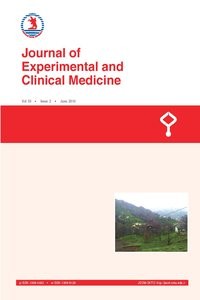The comparative effects of local anaesthetics on wound healing in rats: Bupivacaine vs Levobupivacaine
Abstract
The aim of this study is to investigate the effects of local anaesthetic agents (bupivacaine and levobupivacaine) on wound healing in rats. Wistar albino rats were randomly assigned to three groups (n=10 per group); the control group, the bupivacaine group, and the levobupivacaine group. An incision measuring 5 cm in length was made over the dorsum in all groups. The incisions were infiltrated with 3 ml of normal saline in the control group, 3 ml of 0.25% bupivacaine in the bupivacaine group, and 3 ml of 0.25% levobupivacaine in the levobupivacaine group. Histopathological examinations and tensile strength measurements were performed on tissue samples taken from the incision line 14 days after infiltration. Epidermal and dermal regeneration scores were significantly lower in the levobupivacaine group compared with the bupivacaine and control groupsm(p<0.05). Granulation tissue thickness, angiogenesis, and tensile strength measurements were not significantly different between groups. Even though incomplete epidermal and dermal regeneration scores were attained using levobupivacaine, both bupivacaine and levobupivacaine had no negative effects on the overall clinical wound-healing process.
Details
| Journal Section | Surgery Medical Sciences |
|---|---|
| Authors | |
| Publication Date | June 16, 2016 |
| Submission Date | February 8, 2016 |
| Published in Issue | Year 2016 Volume: 33 Issue: 2 |
Cite

This work is licensed under a Creative Commons Attribution-NonCommercial 4.0 International License.


